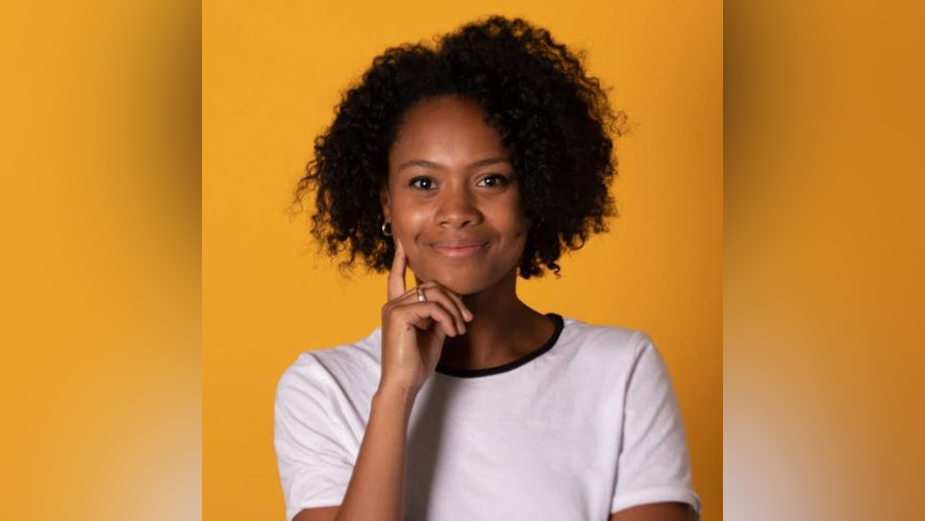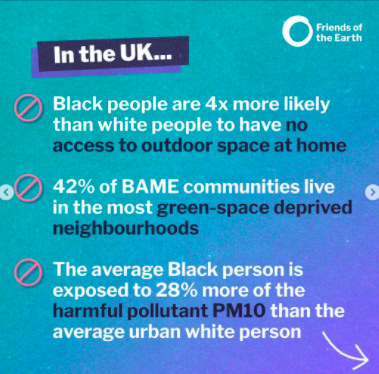
Climate Change at Its Root Is a Result of White Supremacy and Racism

It’s time to present another dimension to the Black British experience which for me means going beyond the month of October and developing conversations that move us past the usual topics of music, food, art, and culture. There’s more to being black in the UK and Climate Change as a topic proved just this. Unfortunately, as is seen in many other subject areas, Black voices are erased from topics that end up affecting them the most.

Photo Credit: @friends_earth Instagram page
Working at Iris, I’ve seen our drive for change through marches, internal policies, initiatives, as well as through our brand work, but there’s still a gap in most people’s understanding of the direct impact white privilege has on issues like this.
Two experts Nandi Mkhzie, from the environmental law charity Client Earth and Tyrone Scott, who ran for the Green Party in Hackney have both worked tirelessly to raise the voices of black people within this space. The aim, to offer us as an agency the tools to become better allies.
They explored themes of racism, eurocentrism, how Black Lives Matter has impacted this topic, and what we all can do to help – it was a thought-provoking whistle-stop lesson which we all came away feeling enlightened from. Here are the key takeouts:
Climate Change at its root is a result of white supremacy and racism.
To understand environmental injustice without considering the historical context of colonisation and capitalism is something which sat with all of us. Climate Change doesn’t start in the 60s or 70s, or finish with David Attenborough. It is an issue that goes as far back as slavery when people from the West pillaged the global south to extract the raw materials, which was justified and facilitated by racism. People of colour in these countries were argued to be ‘savages’ which made the destruction of these communities’ a palatable pill for Western Society to swallow.
Climate Justice, Social Justice, and Racial Justice are all intrinsically linked – you cannot be successful in one without addressing the other.
There has been, and still is, a hugely unequal impact from the result of climate change and the effects can be seen disproportionally by people of colour, marginalised and indigenous communities, the poor, the young and women. This is completely unjust, stats show that they are the very groups that will contribute the least in damaging the climate, yet they often pay the most towards policy responses and their voices go unheard in decision making. The historical concentration of industry and wealth in countries like the U.S and Europe means that they’re responsible for 79% of climate changing emissions.
These same groups are also the most affected by COVID, extreme weather events, pollution and not to mention racial violence.
Consumer culture is fuelling the problem, something that is driven by corporations not individuals
Despite conversations in the media beginning to unpick the nature of fast fashion, big retailers are still undeniably unethical. Tyrone explained that the challenge lies with brands as they are still pushing consumers to buy, buy, buy – without taking stock of where, how and who, has benefited from these purchases.
“Acknowledge, appreciate and learn”
In order to drive change the government should be working to incentivise businesses and creating systems that no longer allow cheap labour, and as Nandi suggested start charging corporations for the environmental costs and impact their product has.
Can brands be part of the solution? Listening, empathising and passing the mic
Green washing is no longer an acceptable stance for brands. The advertising industry is in a unique position thanks to its access to the top table of global brands. We have the opportunity to influence decisions and this is the golden ticket that climate activists would love.
So how do we, in the industry do our bit? The smallest steps we could take would be to ensure that whenever we are working on briefs with brands even at a basic level, there’s an opportunity to bring marginalised groups into conversations. This could be via longer term partnerships or simply just sharing the mic and amplifying those voices. Timberland’s campaign with Loyle Carner, “Nature Needs Heroes” is a great example of brand action. Making a promise to deliver campaigns that have an element of social good built into them, whether that’s donations to green causes or just generally improving their green creds e.g. not using non-recyclable coffee pods.
While it’s a lot to take on board, we’ll end up derailing the chance to solve the issue if we don’t come to terms with this and begin to understand the nuances of the intersections involved.
After the events that have taken place this year, it felt vital to encourage a deeper understanding around the Black British experience. While there’s been a deluge of articles, books and podcasts to support and continue your learning, I believe that anti-racist work needs to go further to affect real change. I created Iris’ ‘I Rise’ initiative as a direct response to this. A name taken from the inspirational Maya Angelou, the platform is here to amplify, uplift, inspire new perspectives from the Black community. The three-part initiative includes:
I Rise Conversations; ranging from climate change to creativity we’ll invite experts to share their knowledge and challenge our understanding.
I Rise Connect; a bi-weekly meet up for the black community within Iris.
I Rise Resources; a bank of resources for people who wish to continue their learning.
If you truly believe you’re an ally and are working towards becoming anti-racist, you should be able to explain what you’ve changed to help a marginalised voice, what you’re going to do that’s fundamentally disruptive? And how on a personal, structural or political level you can affect change?
To see the talk in full, watch here.













